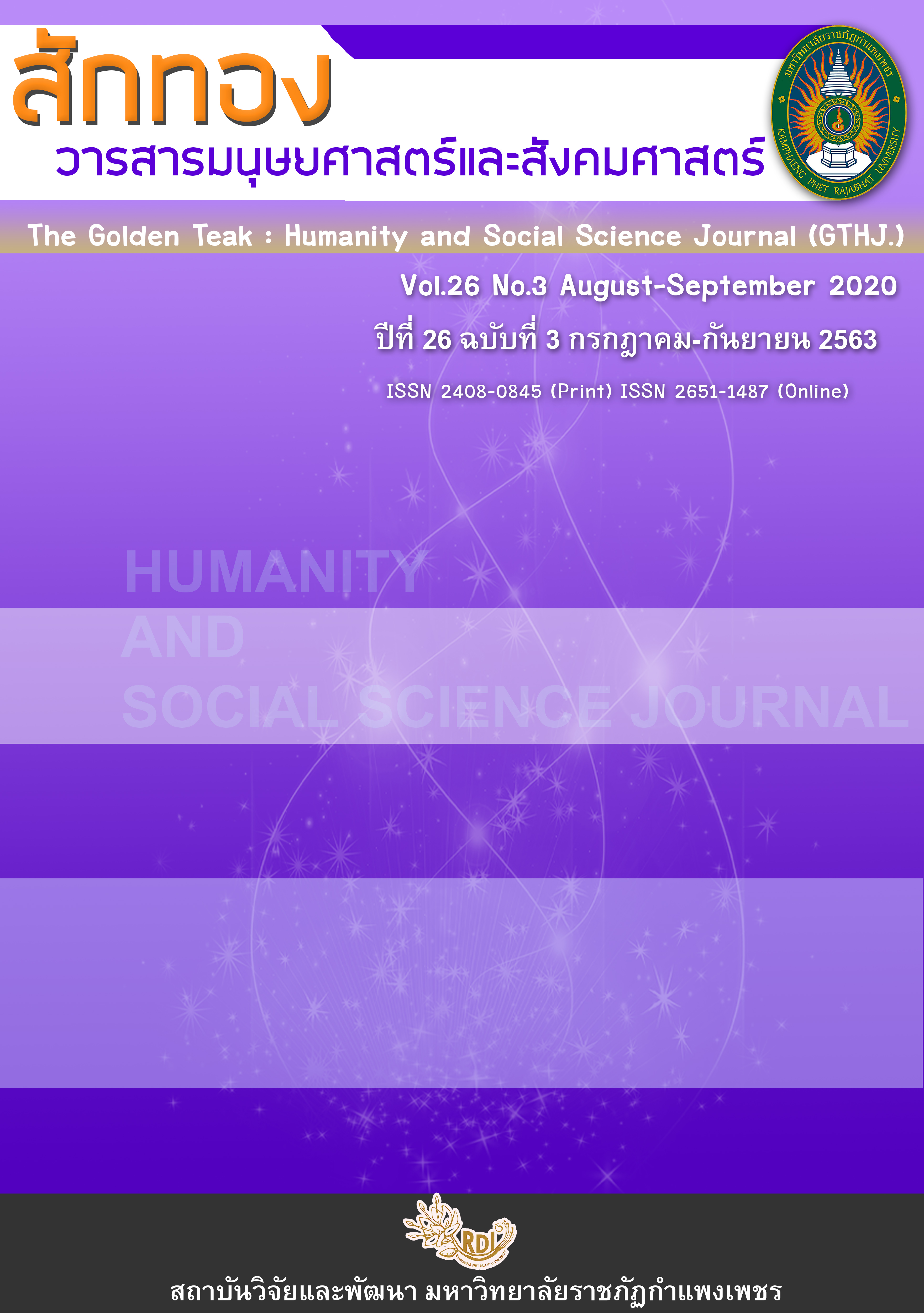A Causal Factors Affecting Loyalty in Bookstore Brand
Main Article Content
Abstract
This research is the quantitative research aiming to study causal factors which influence brand loyalty of bookstores based on the survey research of one-shot case study. Four latent variables were the main approach including customer experience management, social influence, customer engagement, and brand loyalty. Provided data were available from questionnaire tool collected from the example groups who are bookstore’s customers, both male and female of 25-55 years old, residing in Bangkok. The example group were of 400 customers who had bought products and / or been service users of bookstore during the past six months. The collected data were used by the path analysis. The research outcome revealed that customer experience management factor had no any direct influence of bookstore brand loyalty on customers whereas the indirect influence through customer engagement was at 0.232 with a statistical significance at .05. The social influence was of 0.355 of a direct influence over customer’s bookstore brand loyalty with a statistical significance at .05 but had no any indirect influence on customer’s bookstore brand loyalty through customer engagement. However, the customer engagement was a direct influence over customer’s bookstore brand loyalty equal to 0.271 with a statistical significance at .05.
Article Details
บทความที่ได้รับการตีพิมพ์เป็นลิขสิทธิ์ของวารสาร สักทอง : วารสารมนุษยศาสตร์และสังคมศาสตร์ สถาบันวิจัยและพัฒนา มหาวิทยาลับราชภัฏกำแพงเพชร
ข้อคิดเห็นใดๆ ที่ปรากฎในวารสารเป็นวรรณกรรมของผู้เขียนโดยเฉพาะ ซึ่งมหาวิทยาลัยราชภัฏกำแพงเพชรและบรรณาธิการไม่จำเป็นต้องเห็นด้วย
References
River, NJ : Prentice Hall.
Aungsuchoti, S., et al. (2011). Analytical statistics for social science and behavioral science
Research : LISREL program using technique. (3 rd ed.). Bangkok : Charoendeemankhong Printing.
Bowden, J.L.H. (2009). The process of customer engagement : A conceptual framework.
Journal of Marketing Theory and Practice, 17(1), 63-74.
Bunluesin, C. (2010). Customer experience management through social hub of global
brands in service business. Master’s Thesis, Chulalongkorn University.
Chainiran, P. (2010). Social media marketing. Bangkok : Se-education.
Dechkriengkraikun, C., et al. (2003). Experiential relationship management. Bangkok : Amarin
Printing and Publishing.
Doorn, J.V., et al. (2010). Customer engagement behavior : Theoretical foundations and
research directions. Journal of Service Research, 13(3), 253-266.
Fernandes, T. & Esteves, F. (2016). Customer engagement and loyalty : A comparative
study between service contexts. Service Marketing Quarterly, 37(2), 125-139.
Fisher-Buttinger. C. & Chichester, C.V. (2008). Connective branding: Building brand equity in
a demanding world. West Sussex. UK : John Wiley & Sons.
Hollebeek, L.D. (2010). Consumer engagement across differentially service-oriented wine
outlets : Moving beyond consumer involvement to predict loyalty. In U. Waikato (Eds),
The 5th International Academy of Wine Business Research Conference. (pp.350-
535). Auckland : New Zealand.
Jongjitjaroenporn, W. (2006). Customer Experience Management (CEM). [Online]. Available :
http://www.businessthai.co.th/content.php?data=409831_Opinion.
[2017, September 29].
Kevin, K.F.S., et al. (2014). The role of customer engagement in building consumer loyalty to
tourism brands. Journal of Travel Research, 14(2), 1-15.
Masaree, P. (2011). Factors of service marketing components that affect the loyalty of the
working-age consumers in selecting mobile network services in Bangkok. Master’s
Thesis, Bangkok University.
Nantiyanon, W. (2008). Customer experience management strategies of cosmetics
business. Master’s Thesis, Chulalongkorn University.
Otakanon, B. (2009). CEM-Customer experience management. [Online]. Available :
http://inside.cm.mahidol.ac.th/mkt/attachments/295_CEM.pdf. [2018, October 18].
Pine, B.J. & Gilmore, J.H. (1998) Welcome to the experience economy. Harvard Business
Review, 76(4), 97-105.
Promsri, C. (2006). Service with empathy. Bangkok : Nation Books.
Rodphan, K. (2007). Customer experience management for public relations in
bookstore business. Master’s Thesis, Chulalongkorn University.
Santiwong, W. (2006). Factors affecting bank customer's loyalty towards e-banking service.
Master’s Independent Study, Srinakharinwirot University.
Schiffman, L.G. & Kanuk, L.L. (2007). Consumer behavior. (9 th ed). Upper Saddle River, NJ :
Prentice Hall.
Silverman, G. (2001). The secrets of word of mouth marketing : How to trigger exponential
sale through runaway word of mouth. New York : Amacom.
The Publishers and Booksellers Association of Thailand (PUBAT). Book Reading and
Buying Behavior of Thai people. [Online]. Available : http://www.pubat.or.th/ document/20150224050823.pdf [2018, October 18].
Tiangtham, S. (2010). CRM-CEM to Customer Engagement. Brandage Essential, 4(4), 72-81.
Walters, C.G. & Paul, G.W. (1970). Consumer behavior : An integrated framework.
Homewood, II : Richard D. Irwin.


